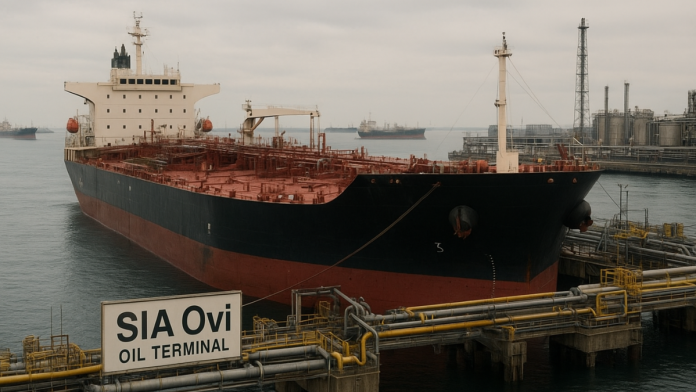Latvia-based companies are reportedly continuing to provide services to vessels connected to Russia’s maritime operations, even though strict European Union sanctions are in place. According to reports from November 10, these activities may be helping Russia bypass international restrictions and maintain revenue from oil transport.
Latvian Ports and the Shadow Fleet
The focus of the reports is on the Cyprus-flagged tanker Zircone, which operates out of Latvia. The Zircone is involved in refueling other ships, a process known as bunkering. Many of the vessels serviced by the Zircone are part of Russia’s so-called “shadow fleet.” This fleet includes ships that carry Russian oil while trying to avoid sanctions and international oversight.
Recently, the Zircone made a stop at the port of Riga to take on marine fuel. It docked at an oil terminal managed by SIA Ovi, a Latvian company that supplies petroleum products in bulk. Company representatives did not comment on the specifics of their clients or the nature of cargo transfers. However, public shipping records indicate that during this port visit, inspectors found eight safety deficiencies on the Zircone.
Hungary escapes U.S. sanctions — Trump approves Russian energy exemption for one year
The operation of these vessels highlights the complex environment in which some Latvian companies are still able to provide services. While the tankers reportedly avoid servicing ships explicitly listed on EU or US sanctions, the existence of special rules for bunkering allows limited exceptions. These exemptions make it possible for certain operations to continue legally while still raising questions about whether they are supporting Russian oil shipments.
Corporate Changes and Bunkering Operations
The Zircone and another tanker, the Rina, were previously linked to Fast Bunkering, a Latvian company once registered at the Port of Riga. Since Russia’s full-scale invasion of Ukraine, Fast Bunkering has altered its corporate details, including its name, address, and ownership. Analysts suggest this could indicate a way to continue operations under new Latvian-registered firms, even while EU sanctions remain in place.
Bunkering operations like those conducted by the Zircone are critical for ships traveling long distances. Tankers need regular refueling stops, which gives service providers in Latvia an important role. However, the presence of sanctions loopholes creates a situation where companies may indirectly assist vessels moving Russian oil without technically breaking the rules.
Thailand in shock — UK blacklists 4 Thai firms for allegedly supporting Russia’s war in Ukraine
Reports suggest that Russia’s shadow fleet has been active in navigating around oil price ceilings and sanctions. Analysts estimate that these operations could have generated around $25 billion in additional revenue for Russia over the past two years. This figure comes from circumventing the intended limits on oil sales and maintaining access to international markets despite global restrictions.
International Links and Insurance Coverage
The operations of Latvia-based companies are also linked to international insurance policies. For example, a New Zealand-based company, Maritime Mutual, was reported to provide insurance for tankers transporting sanctioned crude oil from Russia and Iran. The cargo insured under these policies is said to be worth tens of billions of U.S. dollars, enabling the ships to continue operating despite the sanctions environment.
The connection between bunkering services, international insurance, and shadow fleet operations highlights how complex the enforcement of sanctions can be. While vessels like the Zircone and the Rina may follow the rules related to sanctioned ships, their operations still support the broader network of Russian oil transportation.
The reporting also notes that safety inspections, like those carried out on the Zircone in Riga, are an essential part of monitoring these ships. Discovering deficiencies is part of maintaining operational standards, but it also draws attention to the vessels’ movements and their role in global oil logistics.


